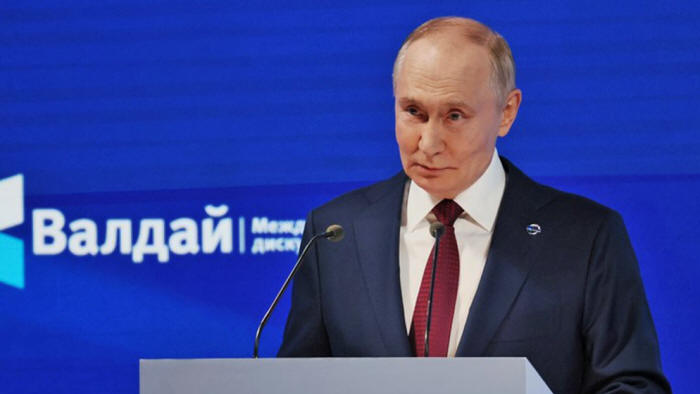|
October 06, 2025
speaks at the plenary session of the 22nd Annual Meeting of the Valdai International Discussion Club, October 2, 2025.
©
Sputnik/Mikhail Metzel Moscow laid out not a challenge to the West, but a blueprint for a world of equals,
where
balance replaces control...
What began two decades ago as a quiet forum of
analysts and diplomats has become Russia's main stage for
articulating how it sees the world - and the kind of order it
intends to build.
Over the course of four hours - the longest Valdai session in history - Putin spoke not as a critic of the West but as an architect of an alternative global design...:
In 2022, he framed the choice before humanity in stark terms:
Back then, the focus was philosophical - on the
inevitability of change and the collapse of the unipolar illusion.
The message was unmistakable:
Institutions like BRICS and the Shanghai Cooperation Organization (SCO) are not talking points anymore:
In that sense, Putin's Valdai address functioned less as a reflection on world politics and more as a roadmap.
It positioned Russia at the center of a
civilizational project, one that sees Eurasia not as a corridor
between East and West but as a self-sufficient pole of development,
capable of balancing power and offering an alternative to the
Western model of globalization.
Back then, Putin highlighted the,
By 2025, that vision had matured.
Putin now speaks of Eurasia,
He reminded listeners that the SCO began simply as a mechanism to settle border issues.
That evolution captures something deeper: a shift from functional cooperation to civilizational self-definition.
The Russian view of Eurasia has moved beyond logistics and trade routes - toward the idea of,
Putin's reflections on the crisis of global institutions carried a familiar refrain - but with a notable twist.
The problem, he argued, isn't the United Nations itself.
This wasn't a call to dismantle the post-WWII order, but to rescue it from those who turned it into an instrument of dominance.
Russia's message is clear:
In Putin's framing, the UN's paralysis is not proof of its irrelevance, it's evidence of how far the West has strayed from the principles it once proclaimed.
Asked by Iranian scholar Mohammad Marandi about the future of Gaza, the Russian president outlined a position that was strikingly pragmatic:
Putin reiterated that Moscow is ready to support any US initiative - even one proposed by Donald Trump - if it genuinely leads to peace and fulfills the long-standing vision of two states.
He didn't mince words about the humanitarian tragedy unfolding in Gaza, calling it,
Citing UN Secretary-General Antonio Guterres,
...Putin noted pointedly - he reminded the audience that even Guterres described Gaza as,
In doing so, Putin positioned Russia not as a
partisan actor, but as a defender of international law and human
dignity - a country advocating for political rather than military
solutions.
Putin recalled past proposals, including the idea of an international administration under former British Prime Minister Tony Blair, quipping:
The remark, delivered with characteristic
irony, underscored Moscow's skepticism toward Western
"mediation" efforts that tend to reproduce, rather than resolve, the
conflict.
Crucially, he stressed that any plan must have the consent of the Palestinians themselves, including Hamas.
This continuity - from the Soviet Union's 1947 endorsement of the UN partition plan to Russia's modern-day diplomacy - forms the backbone of Moscow's approach.
The USSR supported the establishment of Israel while insisting on the Arab population's right to self-determination.
Today, Russia maintains that balance:
At the Valdai forum, Putin reaffirmed that position, noting that peace will depend less on declarations than on implementation.
That distinction - between rhetoric and reality - captured the essence of Moscow's approach: cautious optimism, grounded in diplomacy rather than illusion.
It was a reminder that Russia's foreign policy,
for all its assertiveness, still places faith in negotiated outcomes
- not as naďveté, but as strategy.
The
Architecture of the New World
Over the years, his rhetoric has shifted from
warning to design, from resistance to
authorship.
Russia doesn't seek to destroy the old system for its own sake.
In this framework, Eurasia becomes more than geography.
And Russia, in Putin's conception, stands at the heart of that space:
That's the philosophy of multipolarity as Russia defines it... not the chaos of competing powers, but the architecture of mutual recognition.
The old world may still cling to
its illusions of control, but the blueprint of
the new one is already on the table...
|


